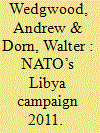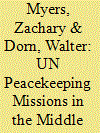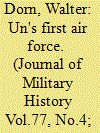| Srl | Item |
| 1 |
ID:
087076


|
|
|
| 2 |
ID:
139832


|
|
|
|
|
| Summary/Abstract |
Colonel Muammar Qaddafi’s violence against the Libyan population in the face of a fledgling rebellion in March 2011 prompted an international intervention. The United Nations Security Council authorised the use of ‘all necessary measures’ to protect civilians and enforce a no-fly zone. Following a preliminary American-led military intervention, the North Atlantic Treaty Organisation sponsored a seven-month campaign, ‘Operation Unified Protector.’ Was the operation ethically justified? Through the lens of the Just War tradition, seven moral principles are assessed in both qualitative and quantitative fashion. The analysis applies the novel Just War Index to the 2011 case concluding that it exhibited a moderate degree of justness overall. Still, significant flaws and ethical problems emerged. While high evaluations were made of just cause, legitimate authority, last resort and right conduct, lower assessments were given for right intent, net benefit, and proportionality of means. The outcome of the intervention is still unknown, but the broad outlines of a moral assessment are distinguishable.
|
|
|
|
|
|
|
|
|
|
|
|
|
|
|
|
| 3 |
ID:
185887


|
|
|
|
|
| Summary/Abstract |
While new ‘multidimensional’ peacekeeping missions emerged at the end of the Cold War, more ‘traditional’ monitoring missions continue to operate. This work reviews the three current peacekeeping missions in the Middle East, with mandates to monitor buffer lines or zones between Israel and its previously warring neighbours: the UN Truce Supervision Organization (UNTSO), the UN Disengagement Observer Force (UNDOF), and the UN Interim Force in Lebanon (UNIFIL). We provide an overview of these three missions, their mandates, the circumstances from which they emerged and evolved. We then consider causal factors that have contributed to their effectiveness over the years and examine how such factors apply in the current state of these missions. Finally, noting that the region evolves and so must the missions, we offer recommendations for how they could remain effective into the future by investing in new technological capabilities and maintaining the integration between their analysis units.
|
|
|
|
|
|
|
|
|
|
|
|
|
|
|
|
| 4 |
ID:
125202


|
|
|
|
|
| Publication |
2013.
|
| Summary/Abstract |
The United Nations Operation in the Congo (ONUC) was created in July 1960 to help the Congolese government quell its army mutiny and reestablish order. After ONUC's mandate was expanded in 1961 to stop the Katanga province's secession, a shooting war developed, in which Katanga paralyzed UN operations with a single armed jet. An aerial "arms race" and open combat followed. In December 1962 ONUC implemented Operation Grand Slam: Swedish jets neutralized Katanga's air force, and the UN's coordinated air-ground manoeuvers forcibly ended the secession. This article uncovers the unprecedented case of air power in UN peacekeeping and evaluates it for twenty-first century lessons.
|
|
|
|
|
|
|
|
|
|
|
|
|
|
|
|